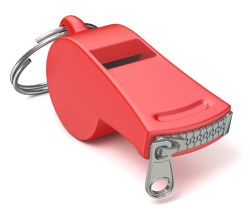Top Class Actions’s website and social media posts use affiliate links. If you make a purchase using such links, we may receive a commission, but it will not result in any additional charges to you. Please review our Affiliate Link Disclosure for more information.
Medicare fraud costs the U.S. government millions of dollars each year, which trickles down to individual taxpayers forfeiting more of their hard-earned money when taxes or medical expenses are raised to cover the losses.
Thankfully, the law protects those who step forward to report Medicare fraud or file a Medicare fraud lawsuit. These people are known as whistleblowers.
What is Medicare Fraud?
Medicare fraud occurs when people try to trick the government into paying for unnecessary services, or paying more for necessary care than it actually costs. While it is considered a white-collar crime, Medicare fraud can result in criminal and civil penalties, fines, and even imprisonment.
According to the Centers for Medicare and Medicaid Services, Medicare fraud usually involves wrongdoers “knowingly submitting” false claims or making misrepresentations of fact to obtain a Federal health care payment for which no entitlement would otherwise exist.”
Another common form of Medicare fraud, notes the CMS, is when someone knowingly solicits, receives, offers or pays kickbacks or bribes to “induce or reward referrals for items or services reimbursed by Federal health care programs.”
Medicare fraud has been committed by individuals acting alone, by associates acting as part of a group, and “organized crime groups” who “infiltrate the Medicare Program and operate as Medicare providers and suppliers,” according to the CMS.
Among the most common misdeeds reported by a Medicare fraud whistleblower are intentionally billing Medicare for more services and care than are actually rendered or billing for services and care that were never provided at all. Sometimes the cases involve doctoring paperwork and falsifying records to support fraudulent claims. Other examples of common Medicare fraud schemes include ordering unnecessary medical equipment, supplies or services and billing Medicare for appointments patients did not attend.
Why Do Whistleblowers Need Protection?
“In the struggle for transparency and accountability, whistleblowers play an invaluable role,” according to the Open Society Foundation. Whistleblowers are often the first and more important reporters of the kind of wrongdoing that harms the public.
A Medicare fraud whistleblower can be anyone with direct knowledge of Medicare fraud, and reporting wrongdoing can be a risk. Whistleblowers have been subject to all kinds of retaliation, which is why laws have been passed to protect them in their efforts to serve the public’s best interest.
Whistleblower retaliation can include not just the obvious firing, but any other adverse action against an employee for blowing the whistle. Per the Occupational Safety & Health Administration (OSHA), whistleblower retaliation can include, but is not limited to:
- Firing or laying off
- Demoting
- Denying overtime or promotion
- Disciplining
- Denying benefits
- Failing to hire or rehire
- Intimidation or harassment
- Making threats
- Reassignment to less desirable positions
- Reducing pay or hours
- Subtle retaliation like isolating, ostracizing, mocking, or falsely accusing the employee of poor performance
- Blacklisting
- Constructive discharge
The False Claims Act is meant to encourage and protect Medicare fraud whistleblowers.
How Does Medicare Fraud Whistleblower Protection Work?
The False Claims Act includes a “qui tam provision,” which allows an individual to file a lawsuit on behalf of the federal government against anyone who has committed Medicare fraud. The government has the right to intervene and join the action, but if it declines, the Medicare fraud whistleblower can proceed alone. The law says if the government or another Medicare fraud whistleblower has already filed a False Claims Act lawsuit on the same evidence, only their action can proceed.
A Medicare fraud lawsuit, which is not usually a class action lawsuit, must be filed within six years from the date of the violation or three years after the government knows or should have known about the violation, whichever is longer, but not longer than 10 years after the violation.
The False Claims Act also includes a first-to-file rule, which refers to the award for which a successful Medicare fraud whistleblower is eligible. At the conclusion of a successful False Claims Act lawsuit, the whistleblower is granted a financial award for bringing the case forward. Only the first person to file a lawsuit alleging Medicare fraud is eligible for the reward.

A 2020 settlement of a False Claims Act lawsuit brought against Teva Pharmaceuticals by two whistleblowers provides an example of the financial incentive for reporting fraud. The former employees were slated to receive $16 million of the proposed $54 million settlement. In another case, a Medicare fraud claim against Genova Diagnostics resulted in a potential $43 million settlement.
The False Claims Act offers specific protections to the Medicare fraud whistleblower in mandating that “any employee who is discharged, demoted, harassed or otherwise discriminated against because of lawful acts by the employee in furtherance of an action under the (False Claims Act) is entitled to all relief necessary to make the employee whole.” That relief includes reinstatement, double back pay, and compensation for any damages, such as legal costs.
Can You File a Whistleblower Retaliation Lawsuit?
Medicare fraud whistleblowers who have been retaliated against can file lawsuits to seek justice. Many have done so.
In 2019, a New York doctor filed a whistleblower retaliation lawsuit against a health system and a number of doctors who allegedly retaliated against the complainant after he reported patient neglect he had witnessed. The doctor said Montefiore Health System and several of its doctors violated both the federal and state False Claims Act.
While working at Montefiore, the doctor said he saw patients being neglected, including being left alone for 14 hours in some cases, and watched doctors “upcoding” claims to increase the amount of money they would be reimbursed for care.
He claimed that three high-ranking doctors at Montefiore Health System participated in a “coordinated campaign of intimidating, coercion, and retaliation intended to silence (the plaintiff), ultimately ending with black-listing and termination of privileges after (he) was compelled to resign.” What’s more, the lawsuit said, “The escalation of retaliation against (the plaintiff) made clear that there was a retaliatory consequence to speaking out about patient mistreatment, treatment deficiencies, upcoding, and complaining about his own retaliatory treatment.”
The National Whistleblower Center says whistleblowers should keep in mind that the protections offered by the False Claims Act “is an issue that currently divides the courts.”
The statute of limitations for filing a False Claims Act retaliation case varies by state.
Filing a Whistleblower Retaliation Lawsuit
If you believe you have witnessed fraud by your current or former employer, you may be able to file a whistleblower lawsuit (also known as a qui tam lawsuit) against your employer on behalf of the government. Filing a lawsuit cannot undo the injustice done to you for blowing the whistle on Medicare fraud, but it can potentially entitle you to reinstatement in your position, financial compensation, and/or other remedies.
Whistleblowers are typically given an award between 15% and 30% of the money recovered in a whistleblower case that the government takes on.
Filing a whistleblower lawsuit can be a daunting prospect, so Top Class Actions has laid the groundwork by connecting you with an experienced attorney. Consulting an attorney can help you determine if you have a claim, navigate the complexities of litigation, and maximize your potential compensation.
Free Medicare/Medicaid Fraud Whistleblower Evaluation
If you are aware of instances of systemic Medicare and/or Medicaid fraud within your place of employment — specifically healthcare facilities like hospitals, doctor’s offices, treatment centers, pharmaceutical companies, and more— take action today.
This article is not legal advice. It is presented
for informational purposes only.
ATTORNEY ADVERTISING
Top Class Actions is a Proud Member of the American Bar Association
LEGAL INFORMATION IS NOT LEGAL ADVICE
Top Class Actions Legal Statement
©2008 – 2024 Top Class Actions® LLC
Various Trademarks held by their respective owners
This website is not intended for viewing or usage by European Union citizens.
Get Help – It’s Free
Free Medicare/Medicaid Fraud Whistleblower Evaluation
Fill out the form below for a free case evaluation. If you qualify, a lawyer will contact you to discuss the details of your potential case at no charge to you.
Oops! We could not locate your form.
E-mail any problems with this form to:













